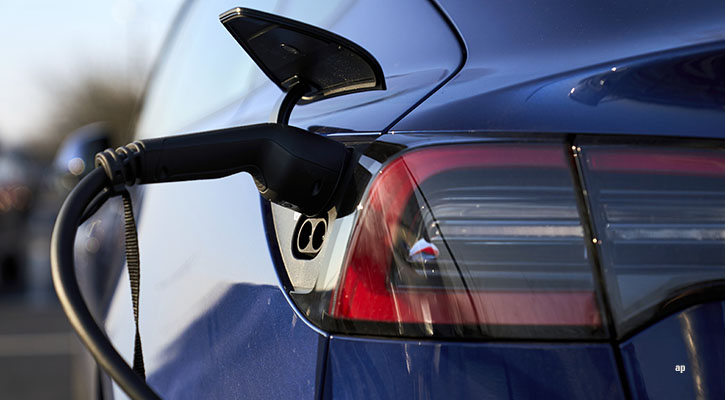
Plans for boosting the number of electric vehicles in the UK are not working as intended, the business secretary has said, on the day Vauxhall’s owner announced it would close its factory in Luton.
Jonathan Reynolds told car manufacturers on Tuesday night he was “profoundly concerned” about how policies meant to phase out new petrol and diesel vehicles by 2030 were operating, and would consult on “a better way forward” while still keeping the target.
His comments in a speech to the Society of Motor Manufacturers & Traders follow Vauxhall-owner Stellantis NV’s announcement that it will close its van-making plant in Luton, putting 1,100 jobs at risk.
The closure forms part of the group’s proposal to consolidate its UK manufacturing of vans to create an all-electric hub at its Ellesmere Port plant in Cheshire, where it is set to invest GBP50 million.
Stellantis said the decision was made within the context of the “stringent” UK zero-emission vehicle mandate.
SMMT Chief Executive Mike Hawes said the news from Stellantis along with Ford’s recent decision to cut 800 jobs from its UK operations over the next three years showed times were “very tough”.
He said: “We’ve seen announcements globally of production cuts, profit warnings, job losses and the UK was never going to be immune.
“A new announcement last weekend and, regrettably, today, are not just a sobering reminder of the challenges the industry faces, but most importantly, of worrying and grave concern for the livelihoods of so many.”
Alongside its annual dinner on Tuesday, the trade body also warned that the pace of the transition to electric vehicles could “devastate” the automotive industry as demand for zero emission vehicles “failed to meet ambition”.
Under the zero-emission vehicles mandate, at least 22% of new cars sold by each manufacturer in the UK this year must be zero-emission, with the threshold rising each year.
Under the current rules, the mandate will reach 80% by 2030, but the government has committed to bring the ban on the sale of new petrol and diesel cars and vans forward from 2035 to 2030, reversing a change introduced by Rishi Sunak’s government last year.
In his speech to the SMMT, Reynolds said the government was “absolutely committed” to the 2030 target, but had “heard you loud and clear on the need for support to make this transition a success”.
Announcing a “fast-track” consultation on changes to the Zev mandate, he said he was “profoundly concerned” about how the policy was operating.
He said: “I’m going to be frank with you—I don’t believe the policies that we have inherited, and I mean specifically in relation to zero-emission vehicles, are operating today in a way anyone intended them to.”
The consultation is not expected to result in changes to the Zev mandate’s percentages, but could include amendments to the options for how manufacturers who miss their targets can avoid being fined.
But proponents of electric vehicles have urged the government to stick to its plans.
Quentin Willson, founder of pro-EV group FairCharge, said: “Ministers should not dilute the UK’s EV ambitions.
“Long-term government policy has made us the second-most successful EV market in Europe—an advantage we should strengthen, not weaken.
“Our Zev mandate targets are world-leading. Don’t let the intense lobbying from legacy auto ruin them.”
Stellantis plans to have the consolidated production line at Ellesmere Port in operation by the second half of 2026, with hundreds of permanent jobs at the Cheshire-based factory for affected staff who wish to relocate from Luton.
The company also said it would offer job support, including opportunities for retraining, to all those impacted – and will work with local government and employers to find new work for Luton-based employees.
A spokesman for the government said: “While it’s encouraging to see Stellantis investing in the future of its Ellesmere Port plant, we know this will be a concerning time for the families of employees at Luton who may be affected.
“We have a longstanding partnership with Stellantis and we will continue to work closely with them, as well as trade unions and local partners on the next steps of their proposals.
“The government is also backing the wider industry with over GBP300 million to drive uptake of zero-emission vehicles and GBP2 billion to support the transition of domestic manufacturing.”
source: PA
The author or authors do not own shares in any securities mentioned in this article. Find out about Morningstar's editorial policies.

























